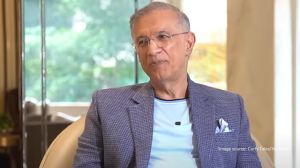At 35.7 degrees Celsius, Mumbai records hottest January day in past 7 years
A day after recording nearly 36 degree Celsius, temperatures continued to hover around 34 degrees on Saturday leaving citizens to reel under a warm, humid weather.
 On Saturday, the worst air quality was observed in Malad West at 247, followed by Mazgaon (246). (Express File Photo)
On Saturday, the worst air quality was observed in Malad West at 247, followed by Mazgaon (246). (Express File Photo)With maximum temperatures soaring to 35.7 degrees Celsius, the city recorded the warmest January day in the past seven years on Friday.
According to the data procured from the India Meteorological Department (IMD), this is the hottest January temperature recorded since 2017, when the maximum temperatures elevated to 36 degrees Celsius at the suburban Santacruz observatory.
Attributing the current rise to the influx of moist South easterly winds, scientists have indicated that the city is likely to reel under the elevated temperatures for the next 2 – 3 days at least, before recording a slight dip.
Indicating a rise of nearly four degrees Celsius above the normal, on Friday, the IMD’s Santacruz observatory recorded a maximum temperature of 35.7 degrees Celsius while the Colaba observatory registered 34.2 degrees.
Data procured from the weather bureau reflected that the warmest day in January in the past 10 years was observed in 2006 when the mercury levels touched 37.3 degrees Celsius.
Speaking to The Indian Express, Sushma Nair, scientist from IMD Mumbai said, “Currently, the city is receiving South easterly winds which are moist in nature.
Typically, during winters, there is a northerly component in the air which is dry. Furthermore, there have not been strong western disturbances (snowfall in the north). Due to this as well as the presence of moist winds, the temperatures have been increasing since the past week and citizens are also experiencing Summer-like conditions.”
Meanwhile, several meteorologists have attributed the warmth of the winter to the fact that the country is currently reeling under an El Nino year. “Whenever there is an El Nino year, winters are warmer whereas the summers tend to be severe,” a weather expert told The Sunday Express.
On the question of relief from heat and humidity, IMD’s Nair added that the city can expect a drop only after January 15. “For the next 2 – 3 days, the temperature may range between 31 – 32 degrees. But the situation may improve after that. While there won’t be a significant drop, the degree of discomfort that people are currently experiencing will not be there,” she said.
A day after recording nearly 36 degree Celsius, temperatures continued to hover around 34 degrees on Saturday leaving citizens to reel under a warm, humid weather.
The night time seemed to bring no respite to Mumbaikars with the Santacruz station recording a minimum temperature of 22 degrees, which is five degrees below the normal.
Responding to questions, Mahesh Palawat from Skymet Weather Services said, “This temperature is slated to drop in the next couple of days. The anticyclone over Jharkhand and other states were resulting in South easterly winds. In the next couple of days, the South easterly will move away allowing the northerly winds to gush in.”
Echoing the IMD scientists, Palawat added that the arrival of northerly winds will usher in the drop in temperatures, post January 15.
Meanwhile, amid the soaring mercury levels, the overall air quality also deteriorated with Mumbai recording an AQI of 135, which falls in the moderate category, reflecting a significant rise since Wednesday when the AQI stood at 87.
On Saturday, the worst air quality was observed in Malad West at 247, followed by Mazgaon (246).







